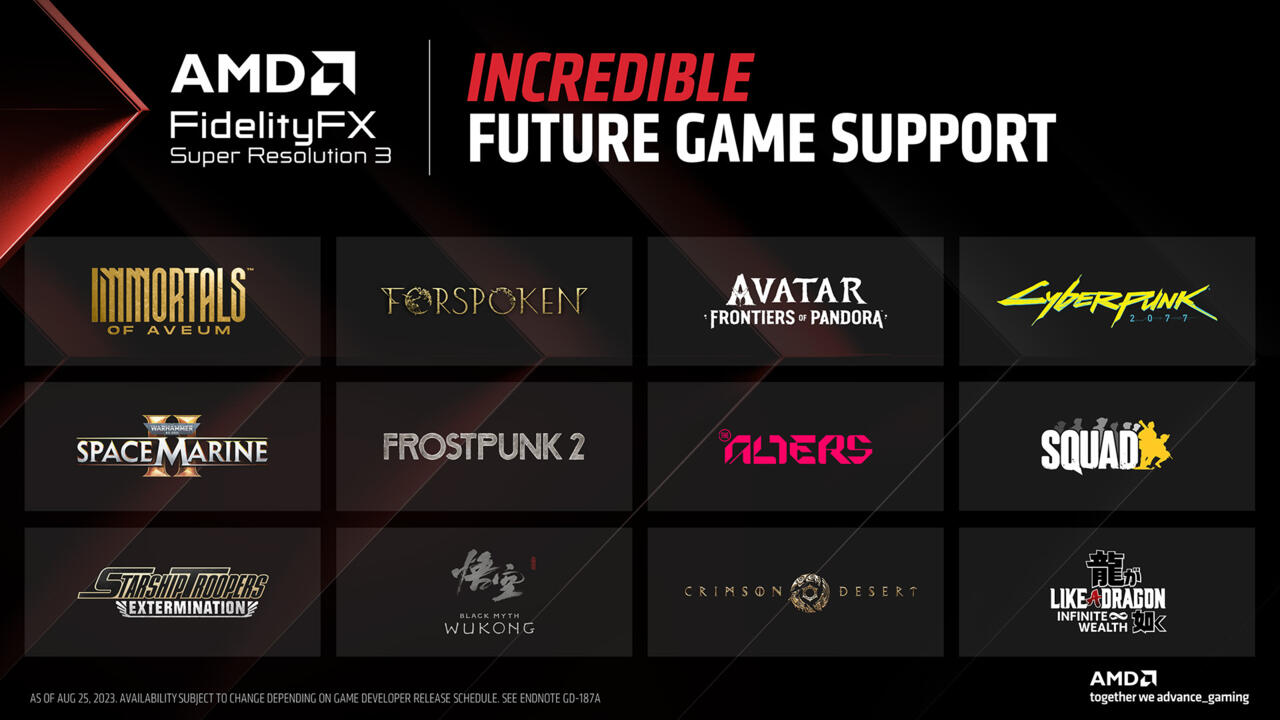AMD has announced the next-generation of FidelityFX Super Resolution, or FSR, with the GPU manufacturer adding its own version of frame generation to the suite of optimization tools.
FSR 3 introduces a frame-generation technique similar to that found in Nvidia’s DLSS 3, but without the requirement to own the latest AMD GPU (or even an AMD GPU at all). Unlike Nvidia’s method, which uses motion vector data from individual frames and utilizes specific optical flow hardware on RTX 40-series cards, AMD leverages software to make up for the missing hardware. The process for injecting synthetic frames in between ones rendered by the game remains the same, but its effectiveness now more heavily relies on how well the underlying game is running.
Since FSR 3 will use software to perform the optical flow calculations, attempting to use frame generation on games already struggling to maintain a relatively high frame rate won’t produce great results, introducing stutter and latency. AMD recommends that a game be running at around 60fps already before trying to apply frame generation on top of that, meaning that it’s gear more towards boosting already good frame rates into much higher territory for high-refresh rate display and not a silver bullet for getting poorly running ones more smoothly. This is also the case with Nvidia’s own frame generation technique, despite its use of dedicated hardware, so it shouldn’t be too surprising.
In addition to frame generation, FSR 3 comes with the same upscaling techniques found in FSR 2, but now with the addition of Native AA. This setting doesn’t render your game at a lower resolution, but instead just applies the same anti-aliasing methods to your native resolution to help overcome games with poorly performing anti-aliasing options. This won’t improve performance alone (it might actually hamper it slightly), but AMD says that in combination with frame generation you can enjoy a much higher quality image with a higher framerate overall.

FSR 3 support will gradually roll out, with Forspoken and Immortals of Aveum being the first titles to feature the suite of options later this year. AMD has announced 10 games that will support FSR 3 in the near future, including Cyberpunk 2077, Avatar: Frontiers of Pandora, Black Myth: Wokong, Starship Troopers: Extermination, and more. Despite being an AMD-promoted title, Bethesda’s Starfield was not on the list. Several developers have also partnered with AMD to support FSR 3 in future titles, including Square Enix, Ubisoft Massive, CD Projekt Red, SEGA, RGG Studio, and others. AMD is also working with Epic Games to incorporate FSR 3 into Unreal Engine 5 for seamless integration with existing projects.
AMD says that frame generation and the entirety of the FSR 3 suite is supported on its latest generation of GPUs, which now includes two mid-range options in the RX 7800 XT and RX 7700 XT. It’s also supported on AMD Radeon cards from the RX 5700 and above. Nvidia’s RTX cards from the 20-series and up are also all supported. For simple super resolution support, AMD says older cards from the Radeon RX 590 and better will be supported, while Nvidia support goes further back to the GTX 10-series of cards.
The products discussed here were independently chosen by our editors.
GameSpot may get a share of the revenue if you buy anything featured on our site.
Stay connected with us on social media platform for instant update click here to join our Twitter, & Facebook
We are now on Telegram. Click here to join our channel (@TechiUpdate) and stay updated with the latest Technology headlines.
For all the latest gaming News Click Here
For the latest news and updates, follow us on Google News.
